15 Guaranteed Ways to Increase Your Self-Esteem
- Happy & Authentic
- Acceptance, Adaptability, Authenticity, Confidence, Denial, Expectations, Forgiveness, Happiness, Imposter Syndrome, Mindfulness, Problems, Self-Development, Self-Esteem, Self-Improvement, Unconditional Love
- on Nov, 05, 2017
- 1 Comments
If you’ve watched my video about self-esteem and you’d like to learn simple ways to develop some for yourself, you’ve come to the right place.
If you haven’t watched the video yet, here it is below. In it, I explain the main differences between self-esteem and self-confidence. I also talk about all the ways building stronger self-esteem can increase your health and happiness. Once you’ve watched the video, read the rest of this article to discover how to make this happen for yourself.
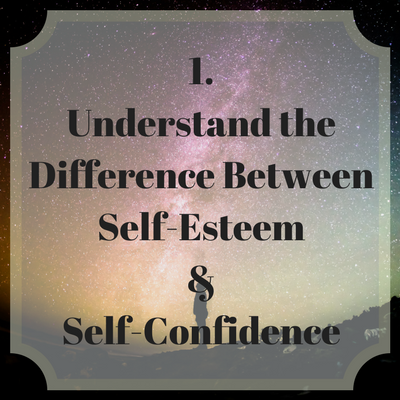
If you haven’t watched the video above, please do so, because it explains the difference between these two concepts. Even if you think you know the difference, watch it anyway just to be sure. It’s very important that you’re able to distinguish between them, because mixing them up may mess with your ability to heal yourself in one or both of these areas.
You might find yourself making little progress in increasing your self-esteem, because what you’re actually doing is taking steps to fix your self-confidence instead. It may not sound like a big deal to you, but when you’re working with such subtle concepts, it’s better to be safe than sorry.
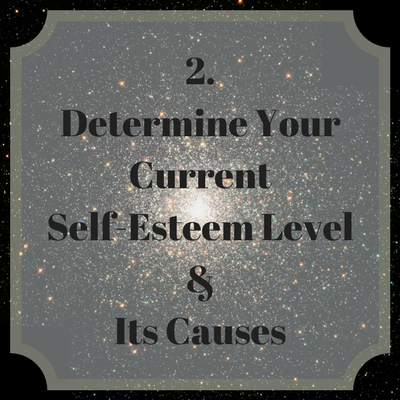
The first and most important thing you need to do is figure out what caused your low self-esteem to begin with. There can be several causes for it, but some of the most common are:
-
Childhood neglect
-
Abuse
-
Bullying
-
Poor performance
-
Loneliness
-
Unemployment
It can be difficult to identify the exact cause of your low self-esteem. But it’s important to try your best to pinpoint it anyway, because you’ll need to tackle it differently, depending on how it came about.
Once that’s cleared up, you should try to determine precisely how low it really is. It might not be as low as you initially thought. Or it might be even lower than you imagined. Either way, the easiest way to do this would be to imagine it resting on a sliding scale, somewhere between 0 and 10. Where do you believe it is? If you find it hard to pinpoint, ask those closest to you and see if they can determine where it might be. The average of everyone’s opinion is usually a good starting point.
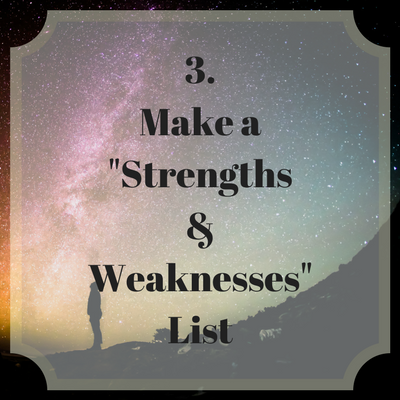
Get a sheet of paper and draw a line down the middle. On the top left, write “My Strengths” and on the top right write “My Weaknesses”. Then list as many as you can for each column. Force yourself to find at least 5 for each, no matter how small or silly they might seem. Again, if you have a hard time coming up with ideas, recruit some helpers. Friends and family are usually better than we are at noticing our strengths and weaknesses.
This isn’t just a list to help you figure out what you could improve upon (from the weakness list), but mainly to prove to you that you don’t completely suck, even though you might sometimes feel like you do. When everything around us seems to be going wrong, all we can see is failures. In those situations, it’s nice to have a list you can resort to that tells you exactly what you don’t suck at. It shows you that there are still a lot of things you have to offer.
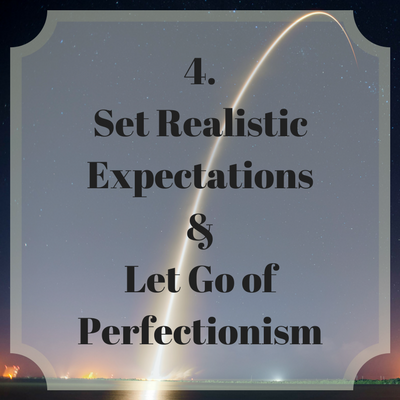
When you expect everything in your life to be like it is in the movies, you’re setting yourself up for failure. In real life, things are always harder than they are for fictional characters. If you’ve convinced yourself that you have to start a six-figure business by the time you’re 25, you’re likely to be disappointed when it doesn’t turn out that way.
It’s important to remember that you’re not a failure for not accomplishing these things. You just need to readjust your expectations. I’m not saying you shouldn’t hope to accomplish great things. I’m just suggesting you acknowledge how hard those things often are and leave some wiggle-room for error. Always assume things will take longer than you initially thought, so you don’t find yourself giving up too soon. And realize that some things are just out of our reach sometimes, and that’s okay. No need to tie the result of your efforts to your self-worth.
No one is perfect. That much is certain. Not even the celebrities who make it seem like they are. There is no perfect body, perfect relationship or perfect life. There is just contentment with the things you have. Your body is yours and it’s beautiful, even if it could use some more time in the gym. Your relationship is yours and it’s absolutely fine, even if you could work a little harder to compromise. Your life is yours and it’s worth being proud of, even if you sometimes make mistakes and you still have dreams to actualize. Accepting those realities will do wonders for your self-esteem. Sometimes “good enough”, is better than best, because it leaves room for improvement and gives you a purpose.
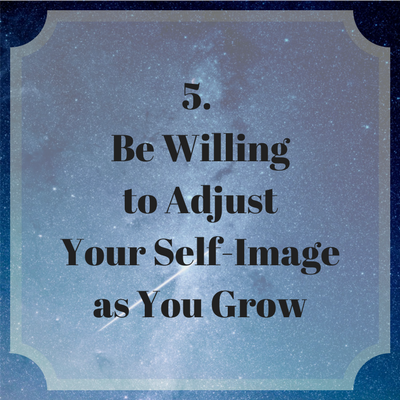
We all change as we grow older. You’re not the same version of “you” that you were 10 years ago, so why should your self-esteem be based on a person who no longer exists? You might have been amazing at something you’re not good at any more. Or you might have wanted to be a doctor, whereas you’d now rather we a carpenter. You need to realize that all of that is okay.
Just like our abilities, our values and beliefs also change with time. Sometimes, we’re so busy rushing towards our old dreams, that we don’t even realize we’ve developed new ones. Better ones. Adjusting your beliefs about who you are and why you need to be a certain way is something that will transform your self-esteem. There is nothing wrong with changing who you thought you are. There are no rules dictating that you remain the same your whole life.
Make sure your evaluations of your abilities and traits are based on what’s going on in your life right now, not yesterday. Be willing to keep adjusting your self-image and your self-esteem will rise to match your current skills.
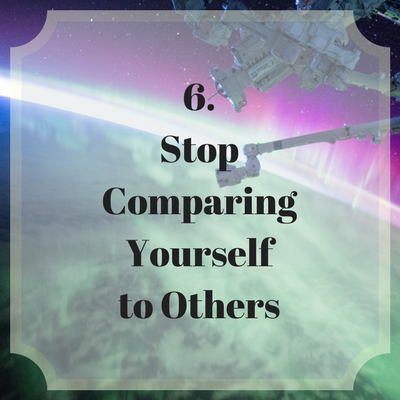
Just as comparing your current abilities to your past self can harm your self-esteem, so too can comparing yourself to other people harm it also. Any comparison of you with someone other than you is an unfair comparison, because not only are you different entities with differing abilities, but you also have different values and life circumstances.
The only time any comparison is fair and valid, is when it’s a comparison with yourself. Not in a way that it puts you down, as we mentioned in number 4 above. But rather in a way that lifts you up and shows you how far you’ve come, how much you’ve grown and learnt. If you’d like more advice on how to stop comparing yourself to others, click here.

We all have certain things we tell ourselves. Stories we’ve created about ourselves based on what we’ve done and what’s happened to us throughout our lives. These stories shape our perception of who we are and, if they’re positive (“I’m a gifted math whiz!”), they can help us feel good about ourselves. But, if they’re negative (“I’m fat and lazy”), they can severely compromise our self-esteem. It’s important to catch yourself when you realize you’re beating yourself up, so you can shift to positive self-talk instead.
Remember that you are not your circumstances. If you failed at something, it doesn’t “make you a failure”. You are simply the same person you’ve always been, and you made a mistake. But you can always fix it. Learning to differentiate between your actions and who you are as a person can be difficult, especially if your guardians growing up would tell you things like “You’re so clumsy” every time you dropped something. If you’re a caregiver of a young child, please remember to use phrases like “What you did was clumsy” instead of “You are clumsy”, as this clearly differentiates the action from the person. But if your caretaker insists on using the former phrase rather than the latter, try to remember that these are their opinions, not facts. Just like the words now floating around your subconscious are just thoughts, not facts. They’re not true.
Negative self-talk is often just the internalized voice of an authority figure who passed these thoughts onto us when we were younger. We repeat them in our minds so often, then sometimes we start to believe they’re true. But just as you learnt to repeat these mantras, you can also learn to stop them. It’s up to you which voice you prefer to listen to.
Instead of damaging mantras like “you’re ugly” or “you’re stupid”, you can start affirmations that you wish you believed about yourself. These new phrases can be repeated to yourself throughout the day and eventually they will stick. To solidify them, perhaps you can ask a loved one you admire and care about to repeat them to you just as often. Hearing kind words from someone whose opinion we respect can often reinforce the idea that these words are true much quicker than if we were the only ones saying them.
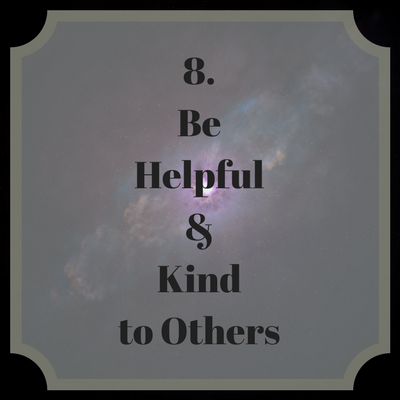
As I said in this video, being nice to other people always rewards us one way or another. Not only does it put you in a better mood when you do something considerate for someone else, but it also proves to you that you are a good person. You’re someone who is worthy of praise and good fortune. And of course, this is true all of the time, for everyone, whether they are nice or not. But our subconscious tends to believe it more strongly when we’re compassionate.
People who are generous feel better about themselves than people who are selfish, so volunteering might be an excellent way to build stronger self-esteem. Being of service to those less fortunate can also put things in perspective for you and prove to you just how lucky you are in certain areas of your life. It takes the focus off your own issues, if just for a little while.
Some great places to volunteer your time or money could be a homeless shelter, an animal sanctuary, a big brother/sister organization, a cancer ward at a children’s hospital or a retirement home. The possibilities are endless, so please don’t consider this an exhaustive list.

Certain people tend to bring us down; negative Nancys send us into a spiral of destructive thoughts, people who make jokes at our expense make us feel bad about ourselves and some people trigger our own negative thinking simply because we associate their presence with a darker time in our lives. When we’re around these people, we just can’t seem to escape their gloomy aura.
Spend as little time as possible with those people. It may be painful to let go of some of them, especially if they’re friends or family members. But if they really care about you, they’ll understand when you explain the situation calmly to them. If they don’t, try your best to distance yourself as discretely as possible. That being said, keep in mind that sometimes, desperate times call for desperate measures and you may need to take matters into your own hands.
Of course, keep in mind that it’s not only the people we spend time with who can bring us down, but also the things we do in our alone time. Pay close attention to the kind of music you listen to, the lyrics of the songs, the types of books you read and quality of content you watch on television and consume online. Seriously consider how it makes you feel about yourself and limit it, if it’s making you feel less than stellar.
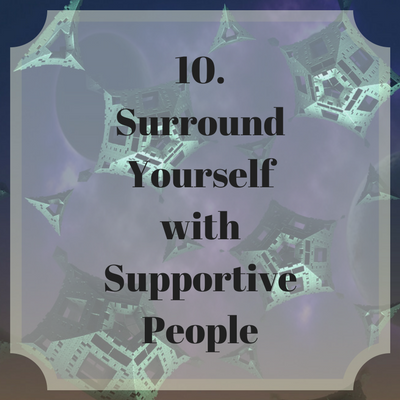
This is the opposite of point number 9 above. We tend to feel better about ourselves when those we spend time with think highly of us, and tell us so. Spend as much time as you can with people like this. If you don’t know anyone like that, it’s time to go out and find some new friends. Even if they’re not friends in the traditional sense of the word, there is always a support group out there that you can utilize, whether it’s online or in person.
If you’ve taken the previous step seriously and spend as little time as possible with people who are unkind, unsupportive perfectionists who don’t respect your goals or efforts, then it’s time to start spending more time with positive, uplifting people who are kind and generous with their praise. We all know at least one person like that and those people are usually more than happy to extend a helpful hand when called upon.
Again, remember the things you read, watch and listen to. Motivational content is all over the place these days. Find a motivational speaker you resonate with and follow them on social media or listen to their audiobooks. Invest in a live seminar, if it’s within your means. I wholeheartedly recommend personal freedom coaches like Preston Smiles, Alexi Panos, Tony Robbins and Nick Vujicic. They’re all incredible people who live to lift others up. Check out their blogs and podcasts, if you can’t afford to hire them.

I’ve spoken about the power of forgiveness in the past and I’m convinced of its healing ability. If you’re curious to hear what I have to say on the matter and would like to see what I suggest to be able to forgive even the deepest transgression, click here.
For now, let’s talk about the reason why it’s so important to forgive people. Holding onto bitter feelings of resentment can keep you stuck in a negative rut. It leaves you thinking about how they’ve hurt you and thus remembering the things you’re better off forgetting. If it’s yourself you haven’t forgiven, the shame of it remains attached to your psyche like a leech, sucking away whatever self-worth you have left.
So who is it you haven’t forgiven yet? Your ex? Your parents? Yourself perhaps? No matter who it is or what they’ve done to deserve it, remember that forgiving them isn’t an admission that you were wrong and they were right. It’s simply an acceptance of your loving nature and and an acknowledgement that everyone makes mistakes, because we’re all flawed. Once you offer forgiveness to those who wronged you, you’ll feel lighter and ready to see just how worthy you are of higher self-esteem.
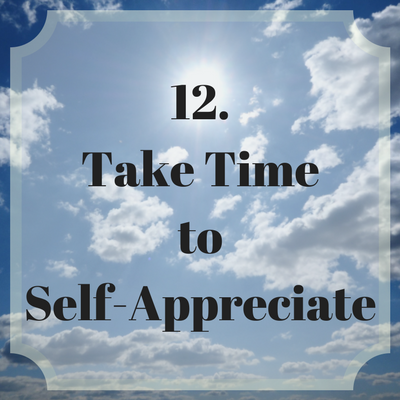
Stop what you’re doing and take a deep breath. Then ask yourself: “What are 5 things I really appreciate about myself?” You can write them down, if you like, or simply think them in your head. Either way, this habit will really increase your sense of self-worth. They don’t have to be massive things. Just things you like about who you are.
Here’s an example:
-
I am kind and helpful to those in need.
-
I can make people laugh.
-
I care enough about the environment to protect it.
-
I love animals and treat them with respect.
-
I am a hard worker and take my responsibilities seriously.
This is based on the idea that being grateful for the little things in life can have a tremendous impact on the way you feel, as I said in this video. Just make sure the things you appreciate are based on who you are as a person, not on things that you have.
Sometimes it’s the act of celebrating that needs to be emphasized, not so much the magnitude of the thing being celebrated. When you get used to getting excited over small things about you that are right, you slowly train yourself to appreciate the larger things as well.

When we talk about “doing the right thing”, that’s always based on the values of the person speaking. We all have a slightly different idea of what is considered right and wrong. So it’s important to differentiate your values from those of the people around you. Sometimes we internalize the values of our parents or other authority figures like teachers and celebrities. We try our best to live up to these ideals, even if we don’t necessarily agree with them, and that creates a dichotomy inside of us. It makes us feel like something isn’t right.
So make sure you know what your own personal values are and stick to them. A great way to determine your values and figure out what’s most important to you is using this online test I devised. Simply follow the instructions and it will help you discover whether you are actually doing what you think is right, or just what others want you to do.
When you live by your own values, it raises and strengthens your self-esteem. It’s not always easy, but as long as you do the best you can and stay focused, it will help you immensely. Try to be consistent, and to re-evaluate your values often, because they tend to change as you grow older.

Sometimes life grows stagnant as our daily routines solidify around us. This is when it’s important to try something new and to challenge yourself in small (and sometimes even big) ways. There’s nothing wrong with being nicely nestled in your comfort zone, because that’s how you improve on old skills, reinforce neural pathways and strengthen muscle memory.
But trying new things increases your opinion of yourself, whether you did well or terribly. The important thing is that you tried. Keep telling yourself that trying out something new is more important than being amazing at it right away, because it trains you to consider less things scary and uncomfortable.
However, don’t beat yourself up, if you can only manage baby steps. Some of us are slightly more attached to our comfort zone than others. And that’s okay. You will get better at it the more often you venture out of it. Just gently nudge yourself in the right direction.

If you’re really struggling and none of these tips have helped you, it’s time to admit that there’s a larger underlying problem than you initially thought. If you’ve made a reasonable effort to putting this advice into action for a long time and you haven’t noticed much of a difference in how you feel, you need to come to terms with the fact that you are in need of outside assistance.
Now this could be someone you trust, like a close friend, a partner or a family member. Or perhaps you require the help of a professional, like a doctor, a therapist or a coach. If you’ve tried asking for help from the former and it turns out you really need the latter, don’t be ashamed. Ask for help.
If you’d like my help as a coach, comment below, send me a message, or book a FREE breakthrough session through Skype.
You can find more Happiness Strategy videos on my YouTube channel, so subscribe to make sure you never miss an episode! I come out with a new one every single Sunday.
Until next time, remember: Happiness doesn’t require energy. It requires Strategy.



Lovely just what I was looking for. Thanks to the author for taking his clock time on this one. Verna Griffy Wincer